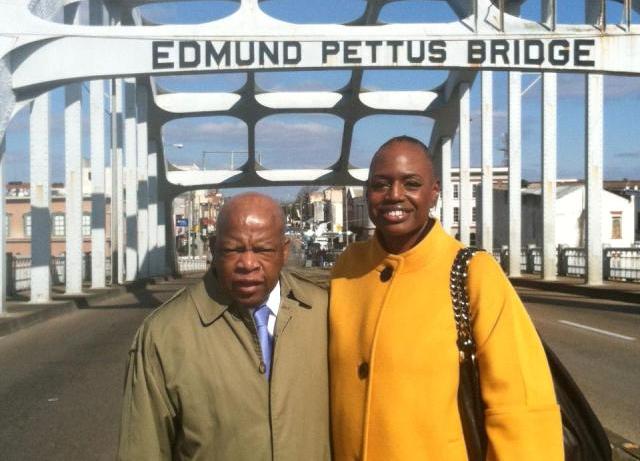
Photo of Rep. John Lewis (D-Ga.) and the Brennan Center’s Nicole Austin-Hillery during this weekend’s Congressional Pilgrimage to Alabama.
Published by The Root DC.
This past weekend in Selma, Alabama, commemorated the 48th anniversary of “Bloody Sunday,” the historic March 7, 1965 attack on civil rights protesters marching from Selma to Montgomery for voting rights. The nation, and the world, were stunned by the violence protesters faced at the hands of Alabama state troopers. Months later, with support galvanized by these events, President Lyndon Baines Johnson, signed the Voting Rights Act into law — ensuring we would never again see the kind of discrimination in voting that the march helped bring to light.
For the past 13 years, Rep. John Lewis (D-Ga.) — one of the brave warriors who helped lead the 1965 march and endured some of its harshest brutalities — in conjunction with the Faith and Politics Institute, has led a delegation of Congress members, advocates, and business leaders on a “pilgrimage” to Alabama.
I had the distinct honor and privilege of participating in this year’s trip, which came days after the Supreme Court heard oral arguments in Shelby County v. Holder, a challenge to one of the core sections of the Voting Rights Act. But rather than discussing the divisiveness engendered by this case, I want to talk about the bridges built between unlikely allies as a result of honoring the legacy of this march.
This yearly pilgrimage is not simply about commemorating Bloody Sunday. It is about far more — even more than most of us knew when we boarded the plane to Alabama. Rep. Lewis started the trip to bring members of Congress together for a shared experience focusing not just on one of the most brutal incidents in our nation’s history but, more pointedly, on healing the divisions created by that moment in history, which sadly, as we saw during the 2012 election cycle continue to this day, and learning lessons from that healing.
Over the course of three days we witnessed nothing short of miracles. We listened to Peggy Wallace Kennedy, daughter of former Alabama segregationist Gov. George Wallace, talk about the difficulty in making sense of her father’s actions during his post as governor and reconciling that with the redeemed man he grew into later in life. She talked about what that legacy meant for her, and more importantly, for her children who live in a world far different than the one she experienced as a little girl.
Many of us watched in amazement as Montgomery’s police chief handed over his badge to Rep. Lewis as an apology for the police department’s failure to protect the protesters who came to their city to do nothing more than peacefully stand up for the right to vote.
We witnessed this history, but also the power of redemption, understanding, and bridge building — even among the members of Congress (from both the House and the Senate) who took part in this journey.
Party affiliation, the looming battle over spending cuts, or any of the other topics that divide Congress on any given day didn’t seem to matter. What mattered was that everyone on the pilgrimage experienced what Rep. Lewis has so often touted — the power of healing and forgiveness. Many members remarked over the course of our three-day journey that they had never witnessed such powerful breaking down of barriers. They vowed to take this newfound spirit of cooperation back to Washington and put it to use on behalf of the American people. I was privileged to witness this power of reconciliation.
How great it would be if we could somehow take every member of the House and Senate on this same journey. My guess is that so many of the issues that divide our political leaders and prevent them from cooperating would dissipate when examined through the lens of this experience. Somehow, disagreements over tax cuts and nominees seem to pale in comparison to figuring out how to move forward from a legacy of hate and violence toward creating one of forgiveness and understanding.
I truly hope that the members who took part in this journey will hold tight to the experiences and lessons learned this past weekend. That would give us all hope for a kinder and gentler Congress that could focus on what’s most important, making this country better for all Americans. That would be an unexpected legacy of the civil rights movement — but one that is equally powerful.